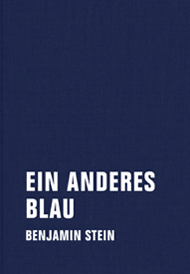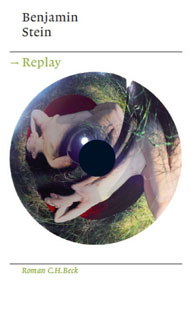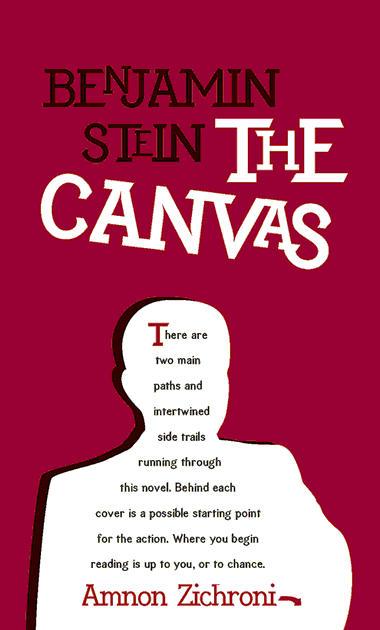••• Google digitalisiert unermüdlich die Inhalte von Büchern. Und so kommt es, dass man (wie hier die Herzdame) per Zufall auf eine Veröffentlichung stoßen kann, die das eigene Werk zum Inhalt hat und darüber einiges Erstaunliche behauptet. In diesem Fall handelt es sich um die Anthologie »Contemporary Jewish Writing in Germany: An Anthology« (Leslie Morris, Karen Remmler, erschienen 2002).
Was Literaturwissenschaftler nicht alles zu wissen meinen…
In Benjamin Stein’s first novel »Das Alphabet des Juda Liva« (»The Alphabet of Juda Liva«), published in 1995, the response to ideas of Jewishness and narrative space are overt. Stein was born in 1970 in East Berlin and now lives in Berlin and Munich. He has won a number of fellowships including the priced Alfred Döblin Fellowship of the Academy of the Arts. His novel is seemingly shaped by the discourse of Latin American magic realism. It moves, through the creation of a Jewish narrator, from contemporary Berlin (after reunification) to late medieval Prague. The novel is framed around the protagonist who hires a storyteller to come on a weekly basis to provide his wife with an ongoing tale. It is storytelling in a Jewish vein that is at the center of this tale. The language of the novel seems to be shaped by the vocabulary of the Kabbala, indeed so much so that, following the model of many Jewish works of contemporary German fiction, it concludes with a glossary of terms for its evidently non-Jewish audience. Here the authenticity of the fictive topography seems to be guaranteed by the authenticity of the language of the narration.
But the »Jewishness« of this voice is suspect specifically because it makes such demands on the very idea of authenticity. Stein’s novel stands in a narrative tradition of the German Democratic Republic, which is being continued here with a massive dose of Jewish mysticism. Beginning the brilliant and original »Levins Mühle« (1964) written by Johannes Bobrowski, an avowed Lutheran writer in the G.D.R., this tradition continues through the first »Jewish« novel, that is, a novel with a Jewish protagonist, in the G.D.R., »Jakob der Lügner« (»Jacob the Liar«) (1969), written by a Jewish writer, Jurek Becker. In both of these texts we have complex narrative strands that demand the presence of a palbable Jewish voice in the text. What makes the voice Jewish is its claim that it stands in a narrative tradition of a folkloric, Yiddish narrative, such as that of Sholem Aleichem. Indeed, it is the musical »Fiddler on the Roof« in its Felsenstein version at the East Berlin Komische Oper that has acted as midwife to this novel as much as anything else.
Stein’s novel, with its magical movements between levels of narrative, uses a self-combusting narrator who moves from contemporary Berlin to medieval Prague through his tale. Stein picks up these G.D.R. traditions of representing a Jewish discourse. But the physicality of the narrator also picks up on the image of the Jewish body and that of the smart Jew. For, like the protagonist of Becker’s novel, the narrator (not Jakob) is the smart Jew, insightful about the past and knowledgeable about the present. But Stein’s narrator is also physically marked as the Jew of the antisemite’s nightmares. He is described by the narrator as »neglectedly bearded and bow-legged« when we are first introduced to him. Again, it is the physicality of the Jew that marks his difference and is used in the novel to delineate Jewish particularity.
Stein’s novel uses, in a more complex narrative form taken from the Kabbala, but it reveals itself to be a German literary response to the world. Here Prague is the antithesis of Germany. The place of non-authenticity is Germany; that of authenticity for Jewish discourse remains Prague. It would seem that the antithesis between modernity and the past, between Berlin and Prague, escapes the »American curse«. But it is actually a trope taken from American Jewish writing of the 1980ies. Both Philip Roth (in The Prague Orgy) and Saul Bellow (in The Dean’s December) place the search of Jewish authenticity in the present in Prague. Thus, the Prague that Stein’s novel represents is not only that of Der Golem (Both Gustav Meyrinck’s 1915 novel and Paul Wegener’s 1920 film), but it is also the American recapitulation in the 1980ies of the notion of Prague as the Jewish place of experience as seen from the world of American Jewish letters. The authenticity of Prague is a place where »real« Diaspora Jews, such as Franz Kafka, lived a life of ambivalence. This is certainly the case in Stein’s novel, even with its movement into the Middle Ages as a contrast to the Berlin of post-reunification Germany.
America, you have it better… Certainly these three writers [Daniel Ganzfried, Maxim Biller, Benjamin Stein, Anm.] reverse this claim, while at the same time honoring it. America is »fun« for the Jews: they become powerful, win Nobel Prices, and build cultural institutions such as the video archive of the Holocaust. American Jews are smart Jews, but they are not tough Jews. They have it easy. They are not superficial and not engaged in the reconstitution of a new Jewish culture, for Jewish culture in America has become mainstream. Since American Jewish culture has never been destroyed, these young writers in Zurich, Vienna, Berlin/Munich confront the literary tradition of American Jewry as well as the anti-Semitism present in their own culture. These three first books show a new level of critical engagement among the youngest Jewish writers in German with the complex world of images and texts in which they live. Is there a new Jewish culture developing in the German speaking world? Evidently so.
Was mich und das »Alphabet« betrifft, ist das alles reiner Quatsch. An keiner Stelle des Buches wird das Mittelalter berührt. Jiri Prochazka ist vielmehr eine Reinkarnation des Rabbi Löw im Prag von 1990. Amerika (und auch seine Literatur) war mir zu jener Zeit entfernter als der Mond. Ich bin hinter einer Mauer aufgewachsen. Prag war neben Budapest, das im Buch eine gleich wesentliche Rolle spielt, schlicht der einzig erreichbare Ort, der sich für eine jüdische Identitiätsfindung anbot. Woandershin war ich nie gekommen. Pikant finde ich auch den Hinweis auf das antisemitisch belegte Stereotyp in der Beschreibung Jacobys, des Geschichtenerzählers. Jene Figur hatte ein so reales Vorbild in meinem Freundeskreis, das ich kein Quentchen hinzuerfinden musste. Er war verlottert und hatte eine gehörige Macke. Mir wäre nicht im Traum eingefallen, seine lebensgerechte Beschreibung könnte von irgendjemandem als vermeintlich typisch jüdisches Stereotyp angesehen werden.
Wenn man dergleichen über das eigene Buch liest, verliert man noch jede Unbefangenheit im Erzählen. Aber nein, auch bei der „Leinwand“ werde ich mich nicht drum kümmern, was man mir in dieses Buch wohl hineininterpretieren mag.






Am 23. Juni 2008 um 23:58 Uhr
haha – literaturwissenschaftler erzählen grundsätzlich den grössten mist. nur bist du einer der wenigen, die da zumindest den kopf schütteln können. den grössten käse behält man sich doch lieber für die after hour zurück, da hat man leichteres spiel.
Am 30. Juni 2008 um 23:36 Uhr
Nicht einschüchtern lassen! Frei von der Leber weg schreiben – sonst haben wir nichts mehr zu interpretieren und dann wird uns langweilig und wir müssen uns neue Sachen einfallen lassen, um unsere Zeit zu vertreiben…
Und die Autorintention interessiert (die wissenschaftlicheren) Literaturwissenschaftler eh net, also nicht ärgern!
Am 2. Juli 2008 um 11:47 Uhr
das hört sich nach einer beschlossenen sache an: text ohne autor, literatur also ohne psyche. ist das nicht eher eine spaltung in der literaturwissenschaft?
wahr ist natürlich, dass der rezipient den text erschafft und nicht der autor. aber diesen in der interpretation auszuklammern zerstört die tiefe dessen, was der text „auch“ meint.
zwar sind die gebäude der traditionellen literaturbetrachtung längst zerstört. gerade daraus ergab sich jedoch das, was man vermeiden wollte: sie fiel dem gefühlsmäßigen und moralischen diktat einiger weniger zum opfer, weil man es nicht verstanden hat, auf jene systeme der erkenntnis bezug zu nehmen, die den modernen geist geprägt haben.
zumindest sehe ich nirgendwo etwas anderes als das kriterium eines decorum, das immer noch danach trachtet, die übereinstimmung der sittlichen und ästhetischen normen der zeit im text zu beurteilen.
Am 30. Juli 2009 um 14:04 Uhr
[…] ist, dass meine Ablehnung neurotische Züge hat und vor allem auf einer Bemerkung in einem US-amerikanischen Essay beruht, der sich u. a. mit dem »Alphabet des Juda Liva« […]